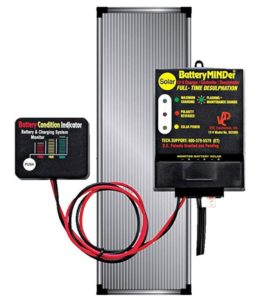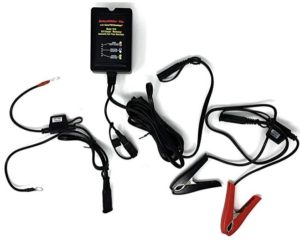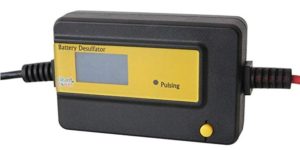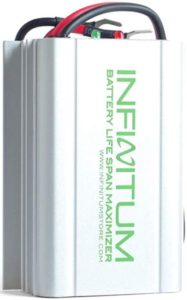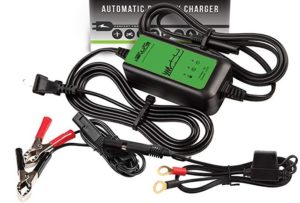Is your truck’s battery dying overnight? Does it also die when you play the stereo for a few minutes with the engine off? If yes, then your battery’s capacity has dropped below the acceptable level. Normally, you can remedy this by buying a replacement battery.
But what if you don’t want to spend on a new battery just yet? Enter battery desulfators.
Battery desulfators, or regenarators, are devices that can restore the capacity of your lead acid battery. The desulfator reverses the sulfation effect on lead –acid batteries hence increasing its capacity and improving the lifespan.
They are also known as battery conditioners or pulse conditioning devices.
Check this too: How Long Will A Winch Run On A Battery?
What is Sulfation and Why Does it Happen?
A lead-acid battery forms lead sulfur deposits on the lead plates that hardens over time reducing the battery’s chemical efficiency. The process is accelerated if your battery stays without being charged for long or charging it halfway every now and then.
This is a common setting for trucks that stay packed for long or are just used for special occasions, for instance on brief offroading weekend trips.
A desulfator sends pulses of electricity through the battery to dislodge the sulfur off the lead plates hence restoring a portion of their ability to store charge.
Top 10 Battery Desulfators to Buy
| Name | Amperage | Battery Voltage | Number of Batteries | Price |
|---|---|---|---|---|
| BatteryMinder SCC-515-5 12 Volt Desulfator | 0.5 Amps | 12V | Up to 2 at a time | |
| BatteryMinder Model 1510 Battery Desulfator | 1.5 Amps | 12V | Up to 4 at a go | |
| CleanPower Lead Acid Battery Regenerator | 4 Amps | 12V to 72V | 1 at a go. You can chain multiple batteries to achieve the 72V limit | |
| Infinitum 12V Battery Desulfator System | - | 12V | 1 at a go | |
| KeyLine Charges KC-125-MPXP | 1.25 Amps | 12V | 1 at a go |
BatteryMinder SCC-515-5 12 Volt Desulfator
This solar powered battery charger is a perfect desulfator for trucks and works autonomously as long as the sun is up and the solar panel is pointed to the sun. It is not only great at reversing sulfation to some extent but also great at preventing your battery from entering that condition in the first place.
You will get better results if you mount the panel in a permanent position exposed to the sun and hook it up to the deteriorating battery or just hook it up to a fresh battery you are storing to avoid the sulfation in the first place.
Pros
- Works on solar power so its green and renewable energy
- Will work autonomously if you install the panel correctly
- Can desulfate or maintain two batteries in storage at a go
Cons
- You will have to spend time installing the panel in a permanent position to avoid the hassle of moving it daily to expose it to the sun
BatteryMinder Model 1510 Battery Desulfator
This compact battery desulfator can push up to 1.5 Amp into up to four 12V batteries at a go making it perfect for storing your truck and car batteries for long times. Other than this, it has a full time desulfator function that reconditions weak battery hence reviving their capacities.
The reconditioner draws power from a wall outlet and works with anything between 90 and 240 volts AC. It will also take into account the ambient temperature when desulfating or recharging the battery to avoid over-temperature damage and also has a circuit to protect the battery from short circuit damage.
Pros
- Can desulfate up to 4 batteries at a go
- A great way to maintain voltage in stored batteries or winterized trucks
- Thermal and reverse polarity sensors to keep the battery safe during reconditioning
- Connects to mains power hence can run through winter
Cons
- You will need to buy extra Y-connectors to support more than one battery at a go
CleanPower Lead Acid Battery Regenerator
The CleanPower batter desulfator also works by sending controlled pulses to your battery to dislodge and dissolve and sulfate deposits on the lead plates. It is a simple unit that is plug and play with no confusing configurations or readings to get in the way.
There is an LED to indicate when its pulsing and a single set button. Moreover, its auto-sensing capability makes it perfect for batteries ranging between 12 and 72V DC. It can drive up to 4 amps when at work despite its compact neat design
Pros
- Compact and light weight
- Simple configurations makes it easy to use
- Works on a wide range of batter voltages
Cons
- The clips on the cables are a bit too small for most batteries
Infinitum 12V Battery Desulfator System
The Infinitum Battery lifespan maximizer claims to extend battery life by p to 3 times. It does this by sending amplitude modulated pulses through the battery at frequencies that are resonant with the sulfur crystals hence increasing the chances of dislodging them from the lead plates.
The desulfator is encased in a neat aluminum casing with resin protected circuits that make it water and vibration resistant. It will auto shut to avoid draining a battery that isn’t being drained making it very handy for your rugged truck.
Pros
- A hardened case that makes it resistant to water, vibration and other abuse
- An auto shut off circuit to avoid discharging the battery
- Works perfect with a regular battery charge attached
Cons
- Can take up to three weeks to make tangible changes so you need patience and a dumb battery charge to keep the battery juiced up
KeyLine Charges KC-125-MPXP
The Mini Pro XP is a fast battery charger with desulfating capabilities. IT will not only revive a dead battery by bringing up to the optimum voltage but also use pulse and trickle charging technology to dislodge sulfation and restore a battery.
It is, none the less, a great option if used to winterize cars or batteries. It is easy to hook up and power meaning that you don’t need extra skills to get your battery set up.
Pros
- Has a decent pulse charge to maintain batteries
- Works well at reviving battery life
Cons
- Lets battery fall to 12 V before recharging which is a bit low
Do Battery Desulfators Actually Work
Traditional battery desulfators applied higher voltage and current in pulses. The voltage is normally higher than what your truck’s alternator or a regular battery charge will push.
A good desulfator not only pushes higher voltage but also should monitor battery temperatures and shut off when temperatures go high. Others just space out the pulses such that the battery doesn’t heat up at all.
Most modern desulfators use a different and safer approach. Instead of upping the voltage, the desulfator sends frequency modulated pulses that are at a resonant frequency with the sulfur crystals hence breaking them down without the overheating.
The desulfation process will take anywhere between 24 hours and a couple of weeks depending on the battery size and the extent of the sulfation. You should keep the battery on trickle charge all along if your desulfator of choice doesn’t double up as a charger.
Bottom Line
Car batteries aren’t something you would buy on a whim. They are expensive and could start acting up when you least expect it. A desulfator is a great way to extend your current battery’s lifespan by a couple of months or even a year as you find the money to buy the replacement. Note that the degree of success varies depending on the state of your battery – and how patient you are during the desulfation process.

